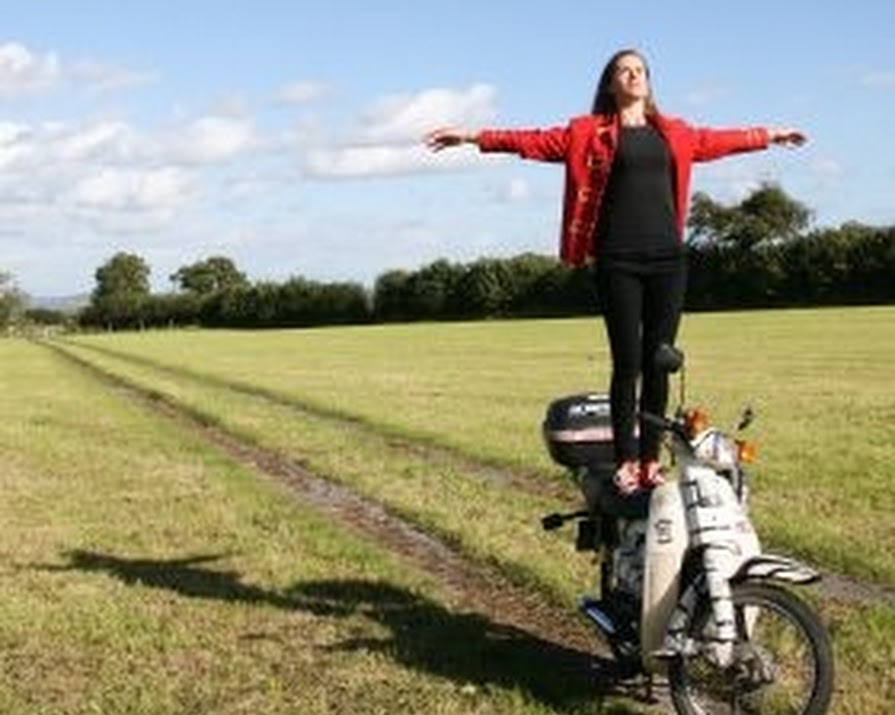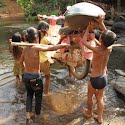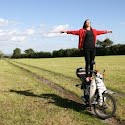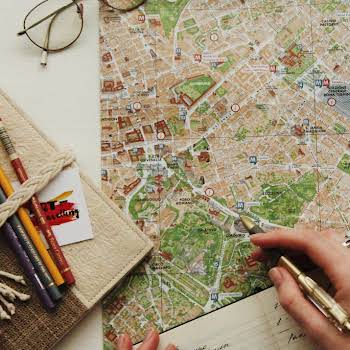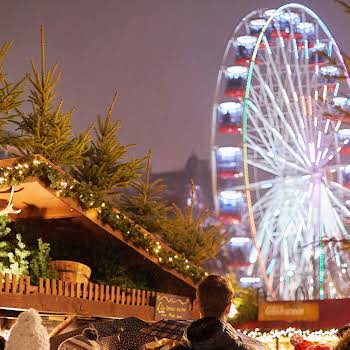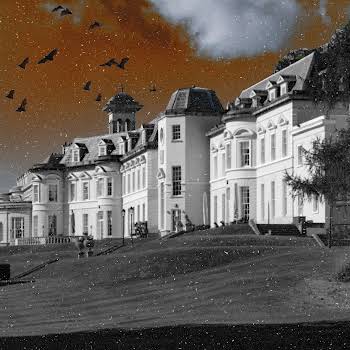
By IMAGE
30th May 2015
30th May 2015
A Short Ride In The Jungle
By Antonia Bolingbroke-Kent
In the spring of 2013, English author Antonia Bolingbroke-Kent set out from Hanoi, the capital of Vietnam, on a 25-year-old, pink Honda Cub motorcycle called The Pink Panther. She spent the next six weeks following the Ho Chi Minh Trail; a legendary transport network, which had once spread 12,000 miles through Vietnam, Laos and Cambodia. The means by which Uncle Ho’s communist North were able to send men and supplies to defeat the American-backed South, the Trail had been the fulcrum of the Vietnam War. Having encountered the Trail whilst working on a BBC documentary the previous year, she decided to come back, alone, to explore what remained of this once mighty web before time, nature and development swallowed it forever.
Here we join Antonia in southern Laos as she makes the tough descent from the Dak Cheung plateau to the scorching plains of Attapeu province. In a single day she rides across bomb-cratered former airfields, through blazing pine forests being cleared by ‘slash-and-burn? agriculture and past long abandoned tanks. She falls off, breaks down, swears a lot, and gets drenched in a tropical thunderstorm. Luckily for her, there was somewhere to stay at the end of it all ?
At Chavan, an old strip once built by the French and used in both Indochina Wars, I rode slowly between the craters, my eyes scanning the ground for stray bombies. By now this had become second nature; every time I stopped for a pee, I stayed on the track, checking the ground around me for UXO (unexploded ordnance) and the nearby shrubbery for snakes and spiders. It was a habit that would stay with me for several months after I got home. A handful of small brown cows grazed, their bells tinkling as they picked at the poor grass, and black holes in the ground were gossamered with the webs of spiders I’d rather not meet. Now the track narrowed, dropping due south through cool, dark, heavily scented pine forests and across parched grass clearings.
Amidst a barricade of pines I passed a grubby couple squatting on the path, roasting skewered bamboo rats over a small fire.
?Pai Sai?? they asked, waving a blackened, toothy rodent at me.
?Attapeu!?
Round the corner the forest was burning on either side of the track. Fire licked the edge of the path and the air was fragrant with pine smoke. Fearful of explosions, I pulled the throttle, accelerating through the smoke and encroaching flames.
Minutes later, I was clunking down a steep, rubbly hill into a grassy clearing when I inexplicably lost balance and tumbled sideways into the dirt. Wincing, I picked myself up: blood was seeping out of a two-inch slash on my left shin and my panniers lay on the ground, both ripped open along the top seams. I couldn’t afford to make such silly mistakes, next time it might be more than just a cut. Hopping and swearing, I led Panther down the hill, pausing to clean the cut and smoke a nerve-calming cigarette. Having secured the panniers with an extra bungee I rode on, trying to ignore my throbbing leg. The only thing for it was to laugh; first a breakdown, now a fall – this was turning out to be an eventful day.
The road snaked up and over hills, a saffron streak slicing through the green. On either side were red UXO markers. Above, grey clouds smothered the last chinks of blue. Farther on, in an avenue of trees lined with purple flowering rhododendron bushes, I met a UXO clearance team; men in blue overalls carrying buckets, spades and metal detectors.
?Pai sai poo-soo – where are you going girl?? they asked.
?Attapeu!?
One of them spoke a little English. ?Attapeu?? he said, raising his eyebrows. ?Oh – it’s 90km from here, road is very bad. You might have to sleep in jungle tonight. And be careful – road ahead is full of holes where we’ve dug up bombies and metal.?
I asked him if this was part of the trail. If Attapeu was that far away and the road was this narrow, I must have taken a wrong turn.
?Yes,? he nodded, ?lots of UXO. Stay on the track.?
I asked him what they were clearing for.
?New bauxite mine,? he replied.
I later heard that there were up to 12 trillion tonnes of bauxite in this part of Laos. Mining it would mean more environmental damage and resettlement. Poor old Laos.
I bumped on slowly through the trees, steering between freshly dug bombie-sized holes and protruding rocks, the track narrowing to a footpath, trees knotting over my head. At this pace I wasn’t going to get anywhere near Attapeu tonight. I only had half a litre of water left, a few bananas and half a tank of petrol. A thunderstorm looked imminent. Sleeping in such a heavily bombed bit of jungle wasn’t something I wanted to do, and I was wary of sleeping in a village where there was no guesthouse. Don, the American biker, had told me some villages ?weren’t always what they seemed?, and that he’d had most of his kit stolen in one once. And a female Lao sociologist – also a biker – had said a lone white female appearing out of nowhere and asking for somewhere to sleep could send the wrong message. She’d often travelled alone in rural Laos and told me she frequently got asked: ?Aren’t you afraid of being raped?? If I wanted to sleep in a village, she said, go with a translator. Ironically, if I had to sleep out, the jungle was probably the better option.
To my utmost surprise the dark path popped out onto a wide, graded dirt road and a group of women walked by, bent against the dust and a rising wind. Racing the storm and time, I leaned forward over Panther and twisted the throttle, nearly jumping out of my skin as a deafening thunderclap cracked over my head.
Something at that moment made me remember it was Easter Sunday. It was 3pm. About now my parents would be belting out hymns in church and my nephew and niece would be tearing open Easter eggs, their faces smudged in chocolate. How far away that all seemed from my present situation – not enough food and water, no idea where I’d sleep tonight and about to get drenched by a tropical thunderstorm. But I was happy: happy to be alone, happy to be pushed like this, enlivened by the adventure. Easter eggs could wait until next year.
It was on days like today that I really revelled in the solitude. I was engaged, focused, determined. On my own there was no one to help me and no one to complain to. If I was with my boyfriend today I probably would have grumbled about my leg hurting, the thunder, being tired. But so what? So what if my leg hurt? What use would telling him achieve? So what if I was tired or hot or cold? He couldn’t change that. As I rode I considered how complaining has become so endemic in our Western, spoilt society: it’s too hot, too cold, too crowded, too expensive. I’ve got a headache, I’m tired, I had a bad day at work; the person in front is driving too slowly, and so on. It’s so insidious we hardly notice it, this drip, drip, drip of negativity that feeds into everyday life. So many of us are guilty of it, yet we hardly notice. I vowed to try and stop when I got home.
Over the next rise I spied a collection of shacks, one of which sold water. A man swung in a hammock and 15 women and children sat torpidly under a metal awning, staring as I downed a whole bottle. Everyone cowered as another violent thunderclap ripped overhead.
?Where’s the nearest hotel?? I asked, using Google translate. My phone got passed around the group, everyone squinting at the screen uncomprehendingly.
?Muong Sanxai,? the man in the hammock replied, seemingly the only one who could read. Muong Sanxai was about 20 miles from here – I had a chance of making it before dark.
From here the road dropped sharply down to the Attapeu valley. For 1,000 metres we snaked interminably down, jolting over rocks and ploughing through deep sand, Panther’s brakes squealing miserably. At the rusting hulk of a tank I stopped briefly to take pictures and clamber on the turret, but with time against me I had to press on.
My hands, neck and shoulders ached from the strain and at several points I let out yelps of frustration as I came upon another steep, sandy downhill slope. The further we went, the worse the brakes became. A hamster strapped to the wheels with paperclips would have been a more effective braking solution. Below me were deep valleys, tendrils of mist and pillars of approaching rain, but I was so focused on staying vertical I didn’t have a chance to take it all in. It was not a pleasurable few hours.
At five o?clock, ten miles from Muong Sanxai, I dropped Panther again, precious petrol pouring out on to the sand as she fell. For the first time on my journey I lost my temper. I swore furiously into the empty air and aimed a vicious kick at Panther’s seat. Hopping with pain and fury I apologised, dragged her up and stamped on the kickstart. Nothing. Silence. Not even a pop.
More than ten tries later it was clear there was no convincing her. Panther was going nowhere. Since it was getting dark and there was no traffic, I was going to have to drag her off the road and find somewhere to sling my hammock. But with a wall of mountain on one side and a steep drop on the other, there was nowhere to go. I walked back to Panther determinedly.
?Right girl, you’re going to start this time, OK,? I said out loud. I gave the kickstart an extra hard kick and she choked into life. We were damn well going to get to that town tonight, even if it wasn’t until midnight.
More rocks, more sand, more vertiginous descents. I was so determined to get there I screamed at myself every time I faltered or threatened to go down again. I wasn’t going to come off for a third time today.
At six o?clock, the sun set behind pigeon-grey clouds and the thunderstorm broke. Blinded by the rain, I hunched over the handlebars and rode as fast as I could. Thunder crashed above me and fingers of lightning streaked across the darkness. I remembered a story a bomb disposal expert had told me about seven of his men getting struck by lightning and how storms like this could trigger UXO. My hands were sodden, my boots wet, my tyres skidded on wet rocks. Water dripped down my helmet and onto my face. I was dangerously low on petrol. Please let me be close, please let us get there soon. Please don’t let me run out of petrol.
Then, finally – lights in the darkness, the dark outlines of houses, the flashing neon lights of a karaoke bar: the promise of shelter at least. Turning off the road I drove straight into the open-sided bar, stopping next to a table of men mid-ballad.
?Yeeeehah!? I cried, taking off my helmet and gloves and peeling my sodden self from the seat. The men stopped singing and looked at me with open mouths. ?Hong ham – hotel?? I asked a teenage boy behind the bar. He shook his head and pointed to a concrete building opposite, then picked up an umbrella and motioned for me to follow him. I unstrapped my panniers and left Panther where she was.
The ?hotel? was damp and degenerate, a den of flickering lights and dripping walls. Through a half open door I glimpsed two prostitutes sitting on a bed, gossiping as they put on their make-up. The boy opened the room at the end of the corridor, yelling at the girls as he did so, and I watched as the three of them changed the crumpled, greying sheets. When he didn’t know how much to charge me, I gave him 40,000 kip. He left, closing the door behind him.
The fan clattered, the strip-lights droned, the concrete floor hopped with tiny frogs. A glance under the bed revealed used condoms, broken beer bottles, old condom wrappers and cigarette butts. In the ?en suite? a Western style loo was cracked and taped over, leaving a bucket, a cold tap and a hole in the floor. Thank goodness I didn’t have diarrhoea. But there was a bed, it was mainly dry and I was ecstatic to have made it here.
Today’s ride had been my toughest yet. Ravenously hungry and in need of a drink, I changed and headed back to the bar, where I was immediately pounced on by a small, suited, extremely drunk man. I recognised him as one of the two whose song I’d interrupted. Like an over-amorous octopus he draped his arms around me and jabbered incomprehensibly, squeezing my waist and stroking my nose. Every time I extricated myself, another pawing arm clutched at me. I showed him pictures of my sister’s children, pretending they were mine. It did nothing to deter him. Instead, he pointed to himself, held up five fingers, and gave me his most virile smile.
By now the bar – a large wooden structure dominated by a cinema-sized karaoke screen – was filling up. Couples drank in shadowy corners and took it in turns to sing, their tuneless wailings blasting out of multiple stacks of speakers. Too tired to resist, I joined the Octopus, an older man and the two prostitutes at their table. The youngest of them, a stunning girl of about 20, sipped her beer inscrutably as the other man leeringly inched a hand inside her denim hot pants. I hoped she was charging him lots of money.
When it came to our turn for karaoke the Octopus pressed the microphone into my hands, grinning idiotically. Why not? I’ll never see these people again. But alas, they had no English songs, not even ?Hey Jude?, ?Bohemian Rhapsody? or anything by Abba. They were spared. Instead, the elder of the two women took the microphone and closed her eyes to sing a mournful Lao ballad.
Emboldened by beer, soon everyone in the bar was taking it in turns to have their photo taken with me. They sidled up, passed their phones to each other and slipped their arms around my shoulders. The Octopus, who by now was almost sitting on my lap, took it one step further and lunged for a kiss. I ducked and said goodnight, scurrying through the rain and locking my door behind me.
Had I made it to Attapeu, I doubt my night would have been nearly so eventful.
Extracted from A Short Ride in the Jungle: The Ho Chi Minh Trail by Motorcycle by Antonia Bolingbroke-Kent, available in Easons and other Irish outlets.
To read more about Antonia and her adventures, check out theitinerant.co.uk or follow her on Twitter @AntsBK.
Through her trip down the UXO-littered Ho Chi Minh Trail, Antonia was raising funds and awareness for the British NGO Mines Advisory Group. To find out more about their work in Southeast Asia and elsewhere, see maginternational.org.
Antonia Bolingbroke-Kent will speak at the Immrama Festival of Travel Writing in Lismore, Waterford on Sunday morning, June 14, where she will host a literary breakfast at Ballyrafter House Hotel discussing her book, A Short Ride in the Jungle: The Ho Chi Minh Trail by Motorcycle. Antonia joins a stellar line-up of travel writers, including multi-award-winning journalist and author Robert Fisk, travel writer and presenter Charley Boorman, and intrepid explorer and author Jonathan Shackleton. The 13th annual Immrama Festival of Travel Writing runs June 11-14, lismoreimmrama.com.











